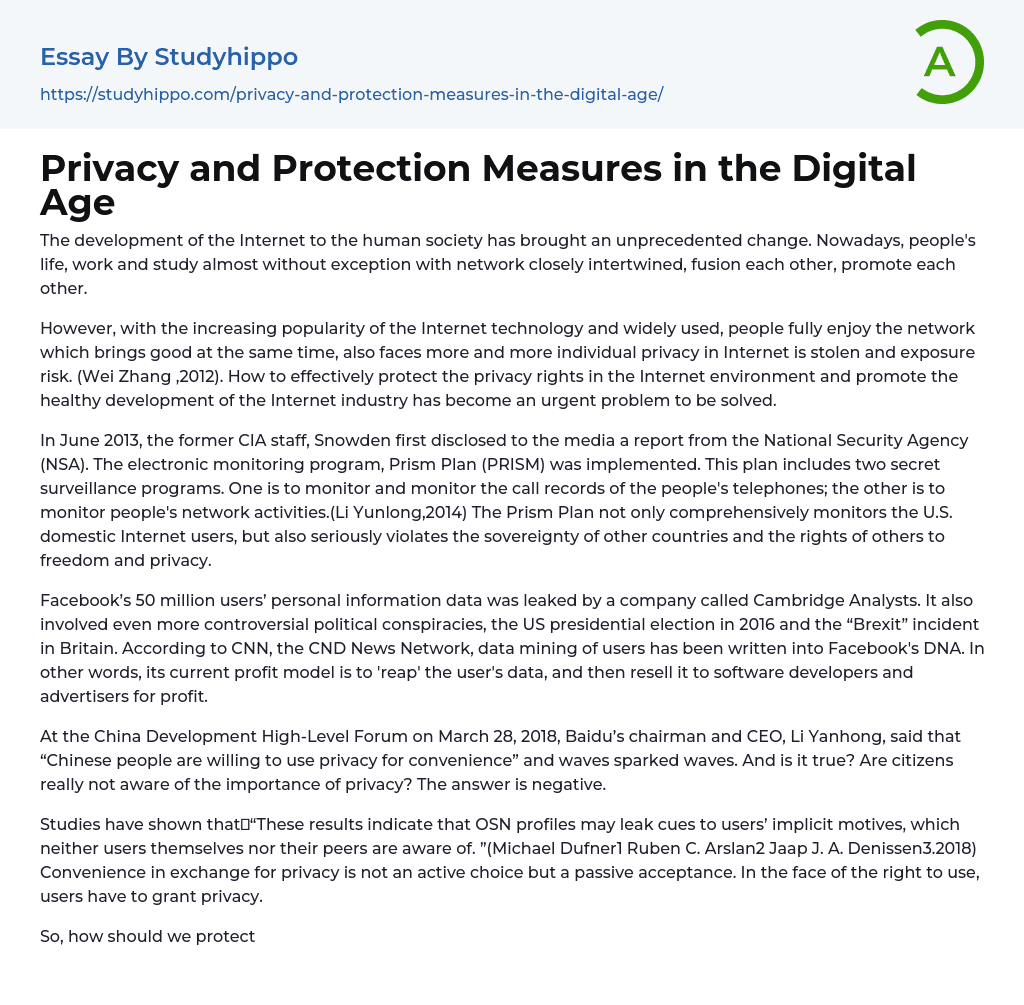

Privacy and Protection Measures in the Digital Age Essay Example
The Internet has brought about a major change in the way human society operates.
As Internet technology becomes more popular and widely used, people's lives, work, and study are increasingly connected to the network. This integration has both benefited individuals and made them vulnerable to privacy theft (Wei Zhang, 2012). It is essential to address this issue by effectively protecting privacy rights online and promoting the internet industry's healthy growth. In June 2013, Snowden, a former CIA staff member, disclosed a report from the National Security Agency (NSA) to the media.
The implementation of the Prism Plan (PRISM) has introduced the electronic monitoring program. This plan consists of two covert surveillance programs. One program involves monitoring and tracking the call records of individuals' phones, while the other program involves monitoring individuals' online activities (Li Yunlong, 2014). The Prism Plan not only extensively m
...onitors internet users within the United States, but also severely violates the sovereignty, freedom, and privacy rights of other nations and individuals. Cambridge Analysts, a company, leaked personal information data of Facebook's 50 million users. This leak also implicated deeply controversial political conspiracies such as the 2016 US presidential election and the "Brexit" incident in Britain.
CNN, the CND News Network, reported that Facebook's business model involves gathering users' data and selling it to software developers and advertisers for profit. During the China Development High-Level Forum in 2018, Baidu's chairman and CEO, Li Yanhong, noted that Chinese people prioritize convenience over privacy, sparking a discussion about citizens' awareness of privacy's importance. Contrary to the belief that citizens are not aware of its significance, studies have shown that social media profiles may unknowingly reveal users' implicit motives
to both themselves and their peers. (Michael Dufner1 Ruben C.)
In the context of the right to use, users are required to grant privacy, as convenience is obtained at the cost of privacy not as an active choice, but as a passive acceptance (Arslan2 Jaap J. A. Denissen3.2018).
To safeguard personal data security from various perspectives, it is crucial to establish better principles for the utilization of big data, as the regulations pertaining to digital life lag far behind. The protection of privacy in the network environment should not only comply with the requirements of the rule of law to fully safeguard personal rights but also guarantee the growth of e-commerce. Firstly, it is necessary to develop a protection model founded on legal regulation and supplemented by industry self-regulation. Additionally, legislation should be improved to enhance the legal protection of privacy rights in the Internet environment (Xu Bin, 2011). Furthermore, we should strive for scientific and technological advancements to strengthen our privacy protection capabilities. Finding a balance between demands for anonymity and changes is essential, and this is referred to as the optimization trade-off problem. In this study, we propose a -Strawman privacy-preserving scheme in weighted social networks to address these challenges.
To address the problem of consistency matching, a greedy algorithm based on a user trade-off metric is proposed (Jing Chen1,2 *, Bowen Zhang1, Min Chen3, Quan Yuan4 and Ruiying Du1,2,2017). Given the age of the Internet, data has become a defining factor in a person's network rather than worldly possessions.
Reference List
- Wei Zhang.TO DISCUSS THE PROTECTION OF PRIVACY UNDER NETWORK ENVIROMENT FROM THE DEBATE OF 3Q [D].BEIJING.China University
of political Science and Law,2012:1-47.
The DOI is 10.1002/sec.1722.



